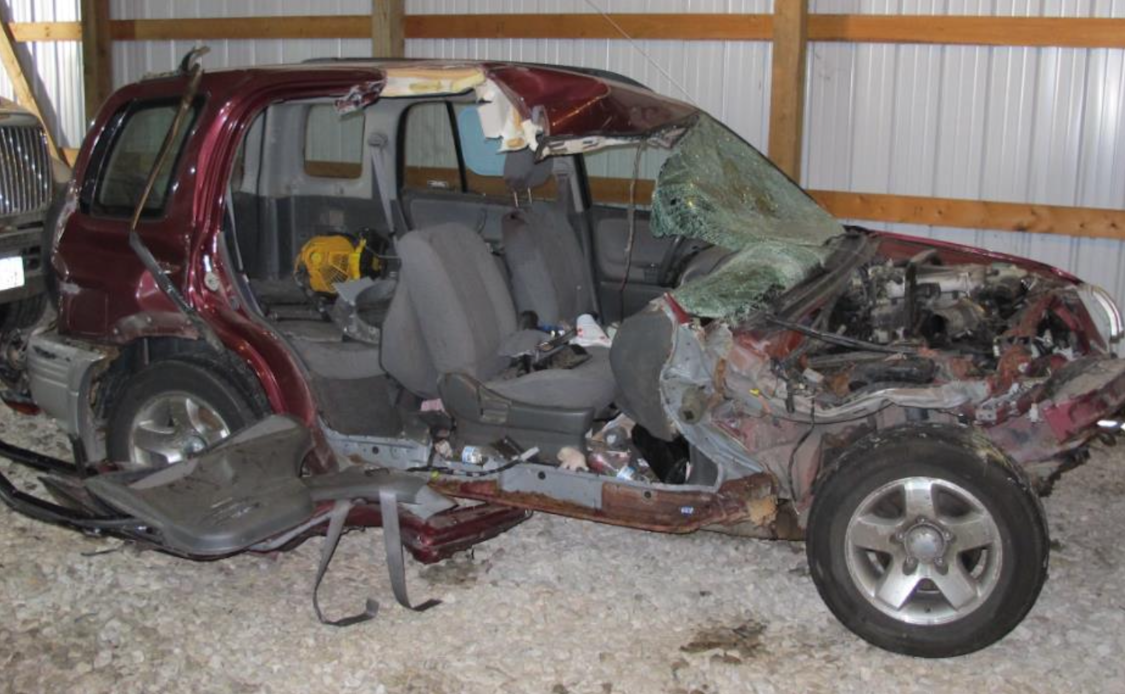Aside from must-do tasks like adopting a budget for the coming fiscal year, Republican leaders of the Iowa House and Senate hope to secure agreement on a few policy bills before adjournment. The outstanding issues include proposed cuts to unemployment benefits, a plan to divert public education funds to private schools, and changes to Iowa’s can and bottle recycling program.
Another priority for legislative leaders is a bill to shield trucking companies from some kinds of lawsuits and cap damages for other legal claims related to commercial vehicle crashes. The proposal lacked enough support among Iowa House Republicans to advance during the 2021 session, and a revised version produced a rare defeat for House leaders in a floor vote last month.
James Bergert lost his wife Joanna Rizzo and was injured himself in a horrific collision on Interstate 35 last August. He and his wife’s estate filed suit March 18 against the tow truck driver who allegedly caused the crash, as well against the trucking company that driver owns. Bergert and his attorney Erik Luthens spoke to Bleeding Heartland recently about the case and how pending “tort reform” proposals would affect future victims of similar tragedies.
SPECIAL PROTECTION FOR THE TRUCKING INDUSTRY
The bill that died without a floor vote last year, despite heavy pressure from House GOP leaders, would have capped jury awards “at $1 million for non-economic damages in commercial motor vehicle cases.” In addition, trucking companies could not have faced civil lawsuits for “negligence in hiring, training, supervising, or trusting an employee” whose harmful conduct prompted the litigation.
An amendment Republicans attempted to attach to an unrelated bill this session likewise limited non-economic damages to $1 million for each plaintiff suing “the owner or operator of a commercial motor vehicle.” New language stipulated that the cap would be adjusted for inflation every two years—not a significant increase for someone who lost a loved one or suffered life-altering injuries.
The revised bill would allow plaintiffs to keep more of any punitive damages awarded in a case stemming from a truck collision. However, such damages are rarely awarded in cases related to vehicle accidents.
Both versions of the legislation would forbid lawsuits against trucking companies for negligence in hiring, training, supervising, or trusting an employee who later caused a crash. The protection would not be limited to Iowa-owned firms; it would extend to all domestic or foreign-owned firms in the industry.
House Speaker Pat Grassley hasn’t given up on finding 51 votes for the proposal.
LAW WOULD BE UNPRECEDENTED
The Iowa Association for Justice represents trial attorneys. In a written statement, the organization’s executive director Brad Lint told Bleeding Heartland, “no state, in the history of our nation, has ever passed a cap on damages specifically targeting trucking crashes. There is no precedent for this.”
He added that Colorado, “one of the few states that allowed corporations to avoid accountability for negligent hiring, training, supervision, or retention,” enacted a law in 2021 to reverse that policy (which stemmed from a state Supreme Court ruling).
Finally, Lint said, “keep in mind that Iowa truck drivers already enjoy some of the absolute lowest insurance premiums in the nation.” The Iowa Association for Justice created this fact sheet using August 2020 data from the Commercial Truck Insurance HQ website, which was designed to help truckers get the best deal on insurance.
Iowa’s average annual rates for commercial trucking insurance are the second lowest in the nation and approximately 26 percent lower than in any state that borders Iowa. At this writing, the site lists the same average rates for Iowa and surrounding states as shown on this infographic.
A DEADLY CRASH
The lawsuit filed in Hamilton County District Court describes what happened on the evening of August 4, 2021, drawing from the Iowa State Patrol’s technical investigation report. Bergert was driving northbound on I-35 near mile marker 141, with his wife in the front passenger seat. The tow truck was on the shoulder until driver Anthony Nessa pulled onto the highway once he was traveling at 30 to 40 mph, “an unreasonably low, unsafe rate of speed for an interstate roadway.”
The truck failed to yield to Bergert’s SUV. Although Bergert swerved into the next lane, the passenger front side of his vehicle struck the driver’s side rear corner of the tow truck. The truck bed “literally sliced through the passenger side of the Bergert vehicle,” decapitating Joanna Rizzo.
Here is one photograph of the SUV following the collision. Other images are part of the plaintiffs’ court filing and the investigation report.
The Bergert vehicle after a collision with a tow truck on I-35
The passenger in the tow truck told the Iowa State Patrol investigator that he felt the impact and “saw in the rearview mirror a vehicle flying by the side,” thinking his own vehicle had fallen off the truck bed. He said Nessa was aware another vehicle had hit the tow truck after he pulled over to inspect the damage.
Nevertheless, Nessa left the scene of the crash and did not return for approximately three hours. He initially sent one of his Tony’s Tire Services employees back to the scene, telling him to “take the blame” for the collision.
According to the plaintiffs’ court filing, Nessa has been convicted of 26 traffic violations since 1995.
“IT JUST IMPACTS EVERYTHING”
James and Joanna used to enjoy spending time together at home or on vacation.
The couple vacationing at Disney
During an interview conducted via Zoom, Bergert recalled that terrible night last August. He realized “the car was opened up like a can opener,” and turned around to see that his wife’s head was gone from the nose up. He still wakes up at night “in a cold sweat with that vision,” and clenches like he’s trying to turn the steering wheel and slam on the brakes.
He can hardly sleep in his own bed and usually tries to get some rest in an armchair. “It just impacts everything.”
His employer, Iowa Select Farms, has given him time off when he needs it and has allowed him to leave work early if he’s having a bad day. But he is “on the road constantly,” covering about 100 square miles every day he works, because his job is to maintain all the company’s pig nurseries in the central part of Iowa.
Bergert’s boss and the company’s CEO have “told me to take care of myself. If my mind isn’t into it, I can get hurt at work. And they would rather have me go home and not get hurt.”
No amount of money could ever make up for what he’s gone through, he acknowledged. “And nothing will ever bring her back.” It tore apart not only their families but also their circle of friends involved with dog shows, where Joanna often judged.
Joanna Rizzo (in background) judging at a dog show
The lawsuit charges that Nessa caused the fatal accident through various kinds of negligence in operating the tow truck. As an individual, Bergert is seeking compensatory damages for injuries including past and future physical and mental pain and suffering, medical expenses, and loss of earnings; loss of his wife’s love, affection, and companionship; and loss of the SUV.
As executor of his wife’s estate, Bergert is seeking compensatory damages for injuries including his wife’s pre-death physical and mental pain and suffering; loss of value to her estate, burial expenses, and services or financial support the deceased would have contributed to her husband.
Plaintiffs are also seeking “fair, just and reasonable” punitive damages to discourage Nessa and others from similar conduct, and are seeking attorney’s fees and court costs.
“A PRIME EXAMPLE OF HOW GOOD PEOPLE WOULD BE AFFECTED BY BAD LEGISLATION”
Bergert said he hasn’t talked to Iowa legislators about how the proposed bill would impact people like him. Since his lawsuit is already on file, his attorney explained, it probably would not be affected by a change to state law. But Luthens noted, “This is a prime example of how good people would be affected by bad legislation.”
Future crash victims could sue the driver of the commercial vehicle, but in many cases not the employer. “Instead of having Iowa juries decide what is an appropriate figure for compensation,” Luthens said, “the legislature wants to substitute its judgment” to cap what could be recovered. Juries consider the facts of each case. “Why not let them decide what’s reasonable?”
Some attorneys have questioned whether it’s constitutional for lawmakers to limit jury awards. Several lawyers in the House Republican caucus were among the holdouts who recently kept the new trucking industry protection language from reaching a floor vote.
Luthens characterized this proposal and a bill to cap damages in medical malpractice lawsuits (which Iowa Republican leaders have also tried to pass, so far without success) as protection for groups that have “the best lobbyists” and contacts. “I guess that’s who your donor class is.”
The lobbyist declarations on last year’s bill reflected support from large trucking companies, insurance companies, the Associated General Contractors of Iowa, and a few business or conservative advocacy organizations. Some trucking companies are led by major donors to Iowa GOP candidates and committees.
Luthens noted the irony that on the one hand, “we want to let people govern themselves and have government out of our lives.” Yet under the guise of being “business friendly,” the legislature wants to help the trucking industry or doctors “at the expense of normal, everyday Iowans who get injured” through trucking accidents or medical errors.
I wondered how common it is for Iowa juries to award more than $1 million in non-economic damages. (A Johnson County jury awarded $97.4 million to a couple in a medical malpractice case last month.)
Luthens said he has rarely seen very large jury awards in the 30 years he has practiced law, primarily handling civil litigation. “Iowa juries are known to be level-headed, reasonable people.” Proponents may claim the bill is about “runaway verdicts” or “lawsuit abuse,” he said, but it is “trying to fix a problem that doesn’t exist” here.
“A VERY SCARY THOUGHT” FOR OTHERS ON THE ROAD
Bergert told me his biggest concern is that if the state caps damages, the big companies are going to tell the insurance companies, pay the million dollars and we’ll “go on our merry way.” There will be fewer background checks on drivers or other safety measures, because employers won’t have to worry about multi-million-dollar verdicts. “That’s a very scary thought” for everyone else who drives on the roads.
Bergert puts about 35,000 miles a year on his vehicle just for work. “So it means a lot to me that these roads aren’t safe.”
Luthens noted that even after more than 25 traffic violations, Nessa “still hasn’t gotten the message of what it means to be a safe driver.” If a bill like this passed, who knows how many other drivers with “checkered safety records” would be operating trucks. And only one group of drivers would have special protection if they caused a collision. “An arbitrary cap is just so wrong for so many reasons.”
In addition, if this bill became law, employers couldn’t be sued for negligence in hiring, training, supervising, or trusting an employee. It could be a green light for companies to take shortcuts on training or have drivers take risks, like spending too many hours on the road or driving through dangerous weather conditions.
Employees are not in a position to refuse a direct order from a boss, as Nessa’s employee demonstrated when he falsely told a state trooper he had been driving the tow truck at the time of the accident. (He recanted after learning the collision had killed someone.)
As someone who spends time daily on interstates and two-lane highways, Bergert worries that if “you put people that aren’t qualified to be behind the wheel of a semi because the companies don’t care anymore, it puts us all in danger.”
He feels legislation “could be better used to make the trucks safer,” so the frames are more compactible and cause less damage to the vehicles they may hit.
Appendix 1: Full text of initial court filing in Estate of Joanna J. Rizzo vs Anthony R. Nessa et al
Appendix 2: Latest version of trucking industry “tort reform” to be proposed in the Iowa House, on March 18
All photos of Joanna Rizzo and James Bergert, including the top image showing the couple during a camping trip, published with permission.






1 Comment
Outrageous!!
I lost a friend years ago to a highway accident that was entirely the fault of a commercial trucker. My friend’s death was a devastating loss to his family, friends, colleagues, profession, and Iowa. And I heard that the insurance settlement was low.
These days, when Iowa Republican legislators work to create a law that no other state has on the books, it is reason for serious dread. That especially holds true for this bill. Almost all of us have a big stake, directly or indirectly, in whether Iowa roads are safe.
PrairieFan Tue 5 Apr 12:52 PM